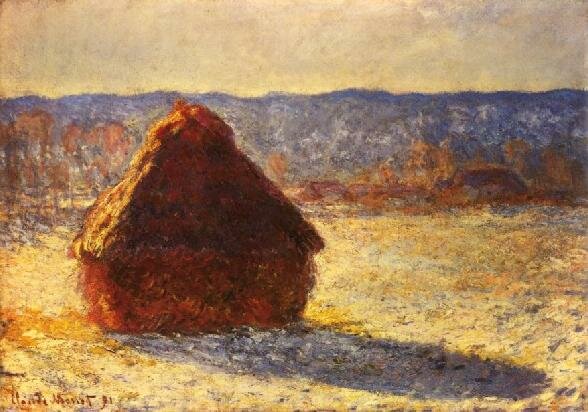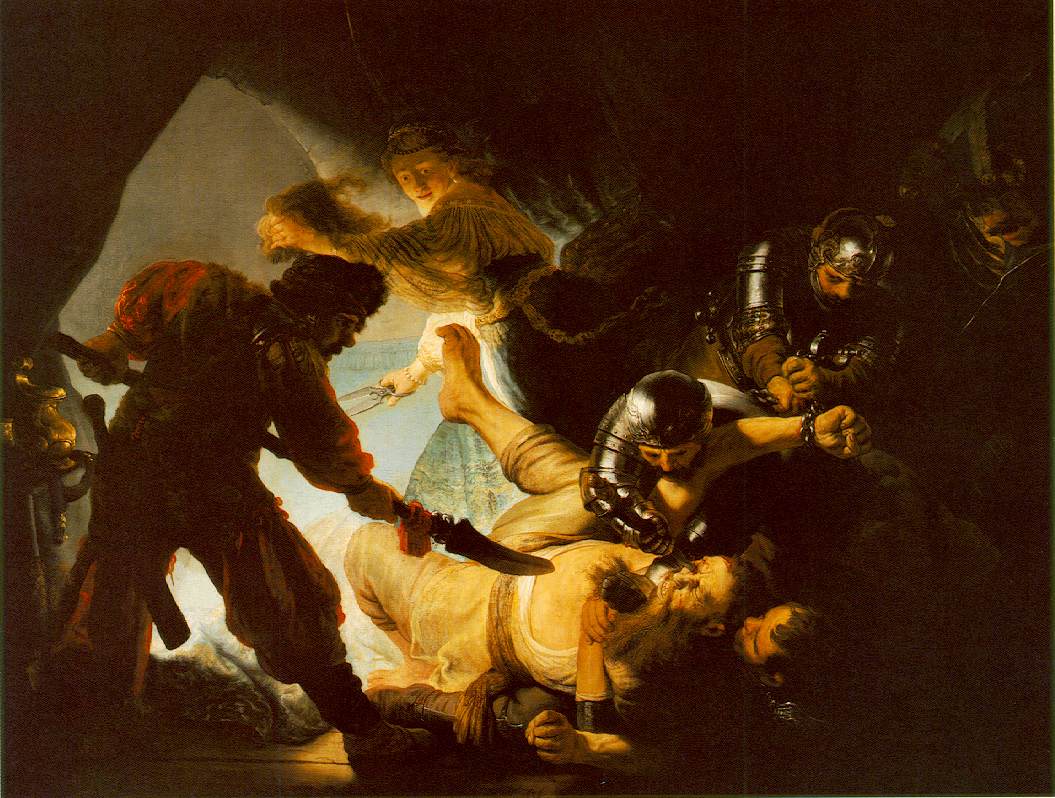Malachi, the Last Prophet
Few dogs get to fulfil the purpose for which they were bred. A golden retriever will excitedly and instinctively chase a stick in a park. But as it is bounding, surely it sometimes must think, “What is the point of all this retrieving? I get the stick, I bring it back - is the world a better place?”

Humans are created to know their Creator. Though we are but clusters of atoms, we are programmed to know the designer who threaded them together. A sense of the spiritual infuses our existence. Even if we never join a church we rile at the sight of injustice and shout prayers in emergencies. In every act of kindness and compassion in every culture, we see proof that we are more than selfish custodians of genes.
Simply being alive means you have the potential to do phenomenal good and appalling evil. In sport and art we see extraordinary achievements. In war and greed we witness overwhelming depravity. Who would ever create such a species, and why are we allowed the freedom to lead inconsistent lives of glory and outrage?
 "
"When we read the bible we start to discover our creator. In the Ten Commandments we receive a manifesto for justice and no longer have to rely on an innate hunch to distinguish right from wrong. In the person of Jesus Christ we see the perfect life, God sharing our fragile humanity yet revealing his celestial glory.

God does not want us to live like house dogs, pottering around bungalows and occasionally moulting before going doddery. In revealing himself, he calls us to live in the light of his revelation - a life which fulfils the purposes for which we were created.
As Paul told the Christians in Ephesus: “[We] are God’s workmanship, created in Christ Jesus to do good works, which God prepared in advance for us to do.”
This means it is not an evolutionary quirk that we feel compelled to act when we learn that 6,500 Africans die every day of a preventable and treatable disease. It also means it was no accident we were born into the families in the lands we grew up in.
The apostle Peter wrote: “[You] are a royal priesthood, a holy nation, a people belonging to God, that you may declare the praises of him who called you out of darkness into his wonderful light.”
 Rembrandt's Peter Kneeling
Rembrandt's Peter KneelingBut when we squeeze the toothpaste in the mornings it’s often hard to feel like a priest in a holy nation. And when we grunt greetings at spouses, children, neighbours and colleagues, it is difficult to imagine us ever declaring the praises of our creator in such a way their lives could be enriched and transformed.

Even when Christians come together to take communion, sing choruses and hear teaching, everything can seem numb. How, we ask, is any of this relevant to the world in which we flounder? We look at the pictures in children’s storybooks about the bible. If only we could have some of the excitement of Noah and his family as they boarded the Ark, or Moses and the Israelites when they abandoned a plague-ridden Egypt for the promised land. It would be so much easier to be a “believer” if we lived at a time when God smote evildoers and spoke in a loud voice. Why is he so quiet today?
These moans aren’t unique to 21st century Christians living in the West. In fact, they echoed in the ears of the prophets who wrote books like Malachi.
There are strong hints that the book of Malachi was written after the Jews had been allowed to return to Jerusalem, their holy city, following many years spent in exile in the Persian empire. The longing to come “home” pulses in Psalm 137:
By the rivers of Babylon we sat and wept
When we remembered Zion.
There on the poplars we hung our harps
For there our captors asked us for songs...
How can we sing the songs of the Lord
While in a foreign land?
If I forget you, O Jerusalem,
My my right hand forget its skill.
May my tongue cling to the roof of my mouth
If I do not remember you...

The return to Jerusalem seemed a miracle, but disappointment quickly seeped through the euphoria. The geographical exile was over, but a spiritual one seemed to continue. God appeared distant, dissatisfied with their sacrifices. When families trekked to the home of their fathers they believed they would enter a world where righteousness reigned. Instead, the selfish continued to be selfish, the meek still got stepped on, and the thirst to know their creator burned on.

It is into this world, one as spiritually barren as our own, that God sent the message of Malachi. The name Malachi means “My Messenger”. In this book God addresses the groanings of a discontented heart with a frankness which remains startling. God reveals the glory for which we were created, and shows us how to live in the relationship with him we profess to desire.

Positioned at the very end of the Old Testament, in every sense in anticipates the coming of Jesus and the example he would give. Its thundering admonitions can still be heard in the epistles. Its rhythms beat from Genesis to Revelation.
It served as a rebuke to the corrupt priests in Jerusalem at the time of writing, and it is a searing exhortation for today’s priests - the men and women who constitute the church - to grasp and live up to the wonder of their calling.
The royal priesthood of Israel were the descendants of Levi. They were the only people allowed to draw close into the presence of God.

God declares in verses five and six of chapter two: “My covenant was with him, a covenant of life and peace, and I gave them to him; this called for reverence and he revered me and stood in awe of my name. True instruction was in his mouth and nothing false was found on his lips. He walked with me in peace and righteousness and turned many from sin.”
There are echoes here of walking with God in Eden. The Fall of Adam tore the Creator and his creation apart, but in the priesthood a handful of humans began to lead lives which hinted at the intimacy the world might once have known.

Priests are at the vanguard of a revolution. Paul told the Romans: “[He] has committed to us the message of reconciliation. We are therefore Christ’s ambassadors, as though God were making his appeal through us. We implore you on Christ’s behalf: Be reconciled to God. God made him who had no sin to be sin for us, so that in him we might become the righteousness of God.”
As estrangement from God ends, so does estrangement with each other. Peace and righteousness break out. As people turn from sin, they turn to the needs of one another. But just as the serpent sowed chaos in Eden, even the most religious people are capable of giving into temptation, of chasing opportunities for personal wealth and exploiting the most vulnerable in their care. If a priest is now someone who leads people into the presence of God, there is the real danger we can also become anti-priests.
God declares in 2:7-9: “For the lips of a priest ought to preserve knowledge, and from his mouth men should seek instruction - because he is the messenger of the Lord Almighty. But you have turned from the way and by your teaching have caused many to stumble, you have violated the covenant with Levi.”
He tells the priests to “set your heart to honour my name”. In today’s language we talk about setting a video to record a television, or setting a radio to pick up a station - it may be a helpful analogy.
We come to church on Sunday mornings and remember Christ’s death and resurrection when we take bread and wine. We affirm that this is the central moment in history, when God changed the rules of the game. Instead of us trying to win his pleasure with good deeds and sacrifices, his son paid the ultimate sacrifice by dying for our sins.

When we are in the company of Christians, this defines us. But during the rest of the week, what is our default position? Do we concentrate every ounce of our energies on getting the cash to pay bills, educate kids, fix the car and stop the leak in the roof?
It takes faith and work to set our hearts to honouring God in the midst of this mayhem. Paul wrote in Philippians 3: “I press on to take hold of that for which Christ Jesus took hold of me.”
Every baptism is the raising of a flag which testifies to the existence of the kingdom of Christ which is breaking into this world. It is the announcement that a new person is pressing on to take hold of that for which Jesus took hold of him or her.
It is easier to run a marathon in the company of others, helping one another keep pace. It is important that anyone who wants to play a role in building this kingdom does not try to do so alone, but pushes on towards this goal in the company of other Christians. But just as each individual athlete needs to train religiously to run a marathon, so we need to ultimately keep our eyes fixed on a living Christ if we are not to stumble.

If our measure of the reality of God’s work in the world is simply the lives of the Christians who surround us we are bound to be disappointed. Well-intentioned men and women end up doing monstrous things in the name of religion.
When God looked down at the corruption in the temple he declared: “Oh, that one of you would shut the temple doors, so that you would not light useless fires on my altar! I am not pleased with you... and I will accept no offerings from your hands!”
Instead of sacrificing the best of what they had, the priests were slaying only crippled and diseased animals. Religion had become tokenistic. Did the families who brought such sacrifices really believe they were approaching the creator of the universe?
God observes: “Try offering them to your governor [a Persian term]! Would he be pleased with you?”
Somehow, daily eating and drinking had become more real to the returned exiles than the creator whom they believed lived in Zion. Secular life seemed to matter more than the invisible world of the supposedly eternal.
This provokes God to fury. He and his message are intimately concerned with the everyday experiences of his creations. The Levitical laws with their precise details on diet and morality demonstrate how important it is to God his people’s lives lead to peace and righteousness.
And this is why God is so determined that his people acknowledge his lordship. People who do not fear him - who do not live their lives in a constant acknowledgement of his existence - will become destroyers of peace.

In 3:5 we read: “I will be quick to testify against sorcerers, adulterers and perjurers, against those who defraud labourers of their wages, who oppress the widows and the fatherless, and deprive aliens of justice, but do not fear me...”
One way of disciplining oneself to think and live in the light of God is to give real money and real goods and real time to him. If we truly want God to be a bigger priority to us than the selfish ambitions which hum during waking hours, we can consciously give him a bigger share of our resources.
It was probably worries about putting food on the table which prompted people to give such lousy sacrifices. Fear of failing crops sent the Israelites running to give offerings to idols.
God’s response is this (3:10): “‘Bring the whole tithe into the storehouse, that there may be food in my house. Test me in this,’ says the Lord Almighty, ‘and see if I will not throw open the floodgates of heaven and pour out so much blessing that you will not have room enough for it. I will prevent pests from devouring your crops, and the vines in your fields will not cast their fruit,’ says the Lord Almighty. ‘Then all the nations will call you blessed, for yours will be a delightful land...’”

At this moment in history, many of the richest countries in the world are democracies filled with Christians. A constant lament is that the church in the West has gone stale, that apathy reigns, and evangelism seems futile.

When we drive past shutdown churches, do we feel like we live in a time of exile? As it says in 2:13: “You flood the Lord’s altar with tears. You weep and wail because he no longer pays attention to your offerings or accepts them pleasure from your hands.”

We live at a time when the lion’s share of the world’s new Christians are found in the developing world, in societies broken with war and disease. The rich nations sell the weapons which bring death, haggle over the drugs and aid which could bring healing and life, and close our markets to their trade that could translate into livelihood.
Do we “defraud labourers of their wages, who oppress the widows and the fatherless, and deprive aliens of justice”? If we lived sacrificially, and called on our elected representatives to give a tithe out of our national wealth, might we be surprised at the blessings we could see?
The apostle James declares: “Look! The wages you failed to pay the workmen who mowed your fields are crying out against you. The cries of the harvesters have reached the ears of the Lord Almighty.”
If we, as priests, are charged with preserving knowledge, it is vital we proclaim the message of Malachi, God’s messenger, at this time.
Eugene Peterson “Malachi creates a crisis at a time when we are unaware of crisis. He wakes us up to the crisis of God during the times when the only thing we are concerned with is us. He keeps us on our toes, listening to God, waiting in anticipation for God, ready to respond to God, who is always coming to us.”
At the end of chapter two, there is the following exchange:
“You have wearied the Lord with your words.
‘How have we wearied him?’ you ask.
By saying, ‘All who do evil are good in the eyes of the Lord, and he is pleased with them,’ or, ‘Where is the God of justice?’”
And in chapter three:
“’You have said harsh things against me,’ says the Lord.
‘Yet you ask, What have we said against you?
‘You have said, ‘It is futile to serve God. What did we gain by carrying out his requirements and going about like mourners before the Lord Almighty? But now we call the arrogant blessed. Certainly the evildoers prosper, and even those who challenge God escape.’”
Just as a scurrying under the floorboards is a sign that a house has a rodent infestation, such comments are a danger sign in the church. They suggest that believer’s faith in a personal God who acts in time and space on behalf of his loved ones is being replaced by an idea of a vague deity who embodies abstract concepts of justice but cannot enforce his principles.
God responds to these sighs by reaching down and grabbing the narrator, lifting him up into the realms of the real and eternal - a hive of celestial activity.

We read: “Then those who feared the Lord talked with each other, and the Lord listened and heard. A scroll of remembrance was written in his presence concerning those who feared the Lord and honoured his name. ‘They will be mine,’ says the Lord Almighty, ‘in the day when I make up my treasured possession. I will spare them, just as in compassion a man spares his son who serves him. And you will again see the distinction between the righteous and the wicked, between those who serve God and those who do not.’”
We are God’s treasured possessions! We, as created beings, are already of more value to our Creator than anything we can make or sell. When we were lost he considered us worth redeeming at a price of immeasurable pain. Let us now strive to set our hearts to honour his name.
Just as James told his readers, “Come near to God and he will come near to you,” Malachi 3:7 has the fantastic promise “Return to me and I will return to you”. A turning, a decision to change trajectory - a repentance - is needed in every generation. But in every era, the promise of an end to exile remains.

Malachi Christianity Theology



















